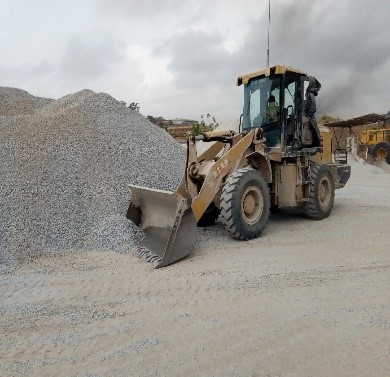Scientists at the CSIR-Building and Road Research Institute (CSIR-BRRI), Kumasi and the KNUST School of Public Health and the University of Washington, Seatle, are calling for upward readjustment of Ghana EPA permissible noise level for heavy industrial areas.
The recommendation comes at the back of research which found the ambient noise permissible limit at 70 dBA to be unrealistic.
A-weighted decibels, or “dBA,” are often used when describing sound level recommendations for healthy listening. While the dB scale is based only on sound intensity, the dBA scale is based on intensity and on how the human ear responds.
The cross sectional study, conducted in the Ashanti and Ahafo regions, was aimed at establishing the occupational noise exposure levels of carpenters and operators of concrete mixers, bulldozers, excavators, among others.
The noise measuring tool known as dosimeter was mounted on a worker’s clothing at the shoulder level to monitor the noise exposure level for each specific task executed.
They found the bulldozer produced the highest average daily noise exposure level and small steel rollers produced the least. All the nine worker groups monitored with the noise dosimeter were exposed to mean noise levels exceeding the Ghana EPA permissible limits by between 10.1dBA and 23.6dBA.
The operators of bulldozer, asphalt-producing plant, concrete mixer, pneumatic tyre roller, carpenters, pay-loader, excavator, steel roller and small steel roller were exposed to average daily personal noise exposure levels of 93.6dBA, 92.4dBA, 87.9dBA, 87.3dBA, 86.4dBA, 86.2dBA, 85.6dBA, 81.5dBA and 80.1dBA respectively.
The peak noise pressure levels from all the equipment exceeded the limits of Ghana EPA (by 50.7dBA–72.6dBA), ISO/NIOSH (by 35.7dBA–57.6 dBA) and OSHA (by 30.7dBA– 52.6dBA). The highest was recorded from the bulldozer, followed in that order by the carpenters, excavator, pneumatic tyre roller, asphalt-producing plant, pay-loader, concrete mixer, small steel roller and steel roller.
“It’s obvious from the study that the Ghana EPA permissible limits for heavy industrial areas, where road construction falls set at 70dBA during night and day is unrealistic,” said the lead researcher at the CSIR-BRRI and Occupational Hygienist, Isaac Kofi Yankson.
The scientists which included researchers from the Komfo Ankoye Teaching Hospital, University of Washington, Seattle and Ghana Health Service, however say, the recommended noise level does not pre-dispose unprotected workers to noise-induced hearing loss over an 8-hour working period.
Mr. Yankson advises owners of construction companies to provide welfare facilities such as pre-employment and in-service medical monitoring.
Latest Stories
-
Ghanaian youth unaware of their right to hold politicians accountable – Youth Bridge Foundation
16 mins -
Judge delays Trump sentencing for a third time
33 mins -
2024 WAFCON: Ghana drawn against defending champions South Africa in Group C
1 hour -
Photos from DW-JoyNews street debate on ‘galamsey’
2 hours -
Mimmy Yeboah: Blending heritage with global sophistication, confidence redefined through couture
2 hours -
100 Most Influential People Awards 2024: Brain Hill International School’s Director Mary Anane Awuku honoured
2 hours -
Akufo-Addo commissions 97-km Tema-Mpakadan railway line
2 hours -
Majority requests recall of Parliament
3 hours -
Kanzlsperger and Professor Quartey support WAFA with medical Donation
3 hours -
Gideon Boako donates 10 industrial sewing machines to Yamfo Technical Institute
3 hours -
‘Golden Boy’ Abdul Karim Razak honored at WAFU-B general assembly
3 hours -
Buipewura Jinapor secures Vice Presidential position in National House of Chiefs with record votes
3 hours -
2024 election: I want results to come out like ‘milk and honey’ – Toobu
3 hours -
Ghana’s Henry Bukari hands over chairmanship of ECOWAS Brown Card Council of Bureaux
4 hours -
Residents of Dome-Kwabenya on edge ahead of December elections
4 hours

